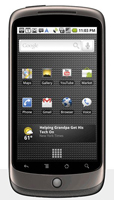Report: Google developing on-the-fly translation software


Google is developing mobile phone software that's capable of translating foreign languages almost instantly, according to a new report.
According to a report in the Times Online (UK), Google plans to have a basic system ready "within a couple of years." The company is building on existing technologies in voice recognition and automatic translation, according to the report.
If Google is successful, it would be the first time that people around the world -- who speak some 6,000 languages -- can instantly and directly speak with one another without another human's intervention.
The United Nations must be salivating at the potential.
Google has already created an automatic system for translating text on computers, constantly improving by scanning millions of multilingual websites and documents. That system covers 52 languages, with Haitian Creole added only last week.
Google plans to leverage that information using the voice recognition system found on Android-based smartphones. By combining them, the company hopes to build software capable of understanding a caller's voice, then translating it on-the-fly -- not quite real-time, however, since it would analyze groups of words, rather than individual words, to ensure proper context.
Accuracy, of course, is the primary hurdle. While direct text translation has advanced very much in recent years, voice is a harder nut to crack; variations in accents and pitch tend to disrupt accuracy. (Example: a heavy Boston accent, a thick Irish brogue, the "verlan" of the French or even the fluttery slang of the Super Bowl champion N'awlins -- er, New Orleans.)
The company believes the software will be able to learn as you use it more -- likely, since a mobile phone is the most intimate of consumer electronics.
With Google's broad reach, it also has the power to leverage all that data collection to improve the accuracy core software -- and perhaps change as languages change, too.
The rub: What does Microsoft have to say about a big, new player in speech recognition technology?